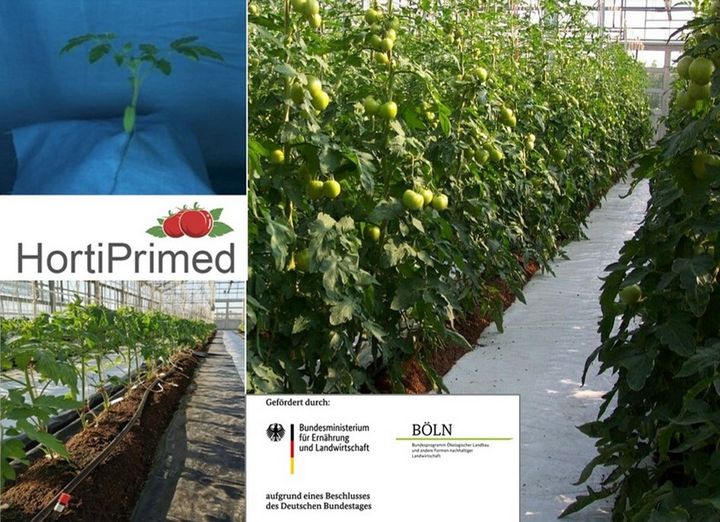HortiPrimed
 Photos by Dr. A. Wiese-Klingenberg, Dr. S. Röhlen-Schmittgen
Photos by Dr. A. Wiese-Klingenberg, Dr. S. Röhlen-Schmittgen
The project HortiPrimed is funded by BMEL/BÖLN and aims at supporting non-chemical plant protection in horticultural production. Horticultural Production systems are influenced by changing climatic conditions which often result in yield and quality losses. HortPrimed tries to use the plant’s natural defense system. When faced with suboptimal conditions, plants naturally adapt by, for example, making metabolic changes that improve their tolerance to recurring stress conditions. In this project, seedlings are exposed to short periods of stress conditions to trigger stress responses and prepare the plant for suboptimal conditions during the production phase. The “priming” effect enables plants to respond faster, stronger, and with improved plant defenses to a stress experience.
In the interdisciplinary project HortiPrimed, which started this year, we aim to stabilize or immunize young tomato plants by abiotic priming to achieve stress tolerance. Specific protocols for abiotic stress pretreatments will be developed as a strategy for non-chemical crop protection in young plant production. The three-year project will focus on identifying optimal priming conditions (Jülich Research Center), evaluating the impact of priming effects on crop yield (Geisenheim University of Applied Sciences), evaluating the efficacy of priming against phytopathogens through bioassays (University of Bayreuth), investigating molecular mechanisms through gene expression studies and identifying DNA/histone methylation associated with priming (Helmholtz Zentrum München), and establishing a holistic modeling approach to capture the expected ecological and economic effects of priming at the farm level (University of Bonn). Together with the Practice Advisory Board, also supported by KoGa (Kompetenzzentrum Gartenbau) , we will introduce the project results into horticultural practice over the project period until the end of 2024 by involving producers and advisory services for horticultural production.
At the University of Bonn, our team from the HortiBonn working group of the INRES Gartenbauwissenschaften uses a decision analysis approach to evaluate and estimate the ecological and economic impacts of priming for introduction into practice.
In this context, we also offer Bachelor and Master thesis topics (english or german) http://www.gartenbauwissenschaft.uni-bonn.de/teaching/
Contact:
Jan-Bernd Schulze LutumDuration:
01-2022 - 12-2024
Further information from the project partners:
https://www.landwirtschaftskammer.de/gartenbau/versuche/artikel/hortiprimed.htm
https://www.hs-geisenheim.de/gemuesebau/stress-induzierte-pflanzentoleranz/hortiprimed/
https://www.fz-juelich.de/en/ibg/ibg-4/news/news/project-hortiprimed-started
https://www.ko-ga.eu/2022/08/31/auftakt-in-projekt-hortiprimed/